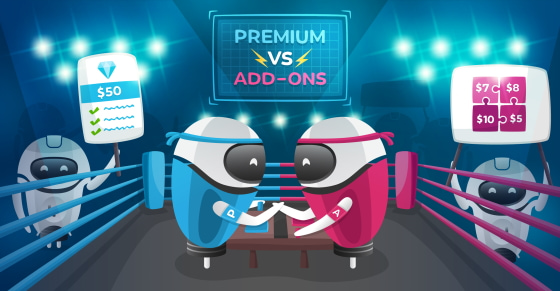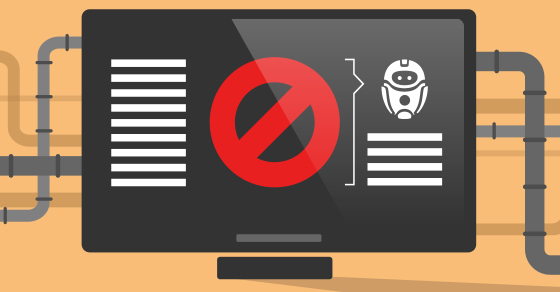|
|
WooCommerce, iThemes Exchange and some other of the most successful WordPress companies have managed to build significant businesses with the add-ons monetization model. It’s very tempting just to follow them based on their success. However, are add-ons the best model for your plugin?
My background and experience is mainly with freemium SaaS products, and not with add-ons. When I started to write this post, I was somewhat biased against add-ons because of the technical complexity that they bring to the table.
To compensate over my prejudice, I reached out and was fortunate enough to be able to discuss add-ons with two business leaders which have tons of experience with add-ons–James Laws from Ninja Forms, and Daniel Iser from Popup Maker. After talking to them, I came to understand that add-ons make a lot more sense than I thought–especially on the business side.
In this post, I extensively detail the pros and cons of using extensions vs. a premium plugin.
Why are add-ons an excellent model?
Technical Side
- Lightweight Core – The whole concept of an add-on is to make the core plugin include the essentials of your product, which makes the “core code” lightweight and (hopefully) easier to configure.
- Modularity – When you create extensions for your plugin, it forces you to build a modular and a more abstract core plugin–which is way better for code maintenance.
- Easy feature maintenance – When you use this model, it’s easier to test, debug, and deploy changes to specific add-on related features. You simply have to push an update to an add-on without the need to release a new plugin version.
- No dual code base – You don’t have to maintain two separate code bases for your core plugin, and instead you can focus on your add-ons.
Business Side
- Lower starting prices – Users can purchase only the features they need, and since it’s only one feature, it probably have a more affordable price. It makes the purchase call-to-action easier since premium plans have a higher starting price that can turn away a good deal of users.
By splitting the functionality into separate modular add-ons, I was able to bring the entry level price way down.
~ Daniel Iser, Popup Maker
- Higher LTV (lifetime value) – You can make more money! When you monetize with premium, you are usually bound to offering up to 5 plans considering the fact it’s nearly impossible to present more plans, side-by-side, on the same screen. Since the market price ranges are already set, it would be very hard to charge more than $200 / year for any of your plans for a single site license (unless you don’t have any competitors and/or you provide some exceptional functionality). This means that the max annual revenues you can get from a user is $200. However, with add-ons, (theoretically) you are unlimited. If you have 100 add-ons, someone could buy all of them, and you can make over $1,000 from one user!
- Better, Positioning Marketing and SEO – Since you sell an add-on, you can market each add-on separately. You can also emphasize every feature to attract attention from users who are looking for that exact functionality. In addition, having an informative page per add-on is great for SEO because people often search for a specific functionality–making these pages a great lead generation channel.
Add-ons create a higher perceived Value – having many extensions shows our customers that we got them covered for the long term.
~ James Laws, Ninja Forms
- 3rd Party Extensions – If your core code is well documented, you can open your plugin for a marketplace– allowing 3rd party developers to build extensions for your plugin that adds even more value to your plugin. You can offer to market / advertise and sell these add-ons from your site and charge a marketplace commission (normally 20%-30%).
- Partners Traffic – Add-ons are great for generating traffic from partners. If your add-on provides a valuable integration of a 3rd party solution with your plugin, it makes a lot of sense for the other solution to promote or feature your add-on, to show their customers that they are covered if they will use your plugin. MailChimp is a great example of a company that took it even one step further and now promote their partners through a repository of integrations.
Why are add-ons worse than a premium version?
Technical Side
- Harder to maintain – If you have 20 add-ons, it means that you need to maintain, test and deploy, 20 code projects. If and when you need to make a change in your core plugin, it can potentially affect all your extensions and will require pushing updates for all of them. With 20 add-ons, that means you’ll have to push 20 updates.
- Harder to change core functionality – Following the previous bullet, making changes in the core plugin becomes way more complicated–you’ll have to be very careful that the change won’t affect compatibility with your add-ons (very similar to the challenges of modifying WP core).
- Compatibility and versions fragmentation – We all know how challenging it is to keep your users regularly updating your plugin when new versions release (excluding “Serviceware” / SaaS plugins). Now when you have add-ons, think of the version fragmentation mess you’ll get. It can be extremely difficult to maintain compatibility across all add-ons and the core plugin.
- Performance degradation – When you develop your plugin for add-ons, you’ll have to make it very flexible with a lot of hooks & filters ready for your add-ons to connect with. Unfortunately, each time do_action executes; it consumes system resources. Having many actions has an effect on the performance (even if slightly).
The technical part is the most challenging aspect of the add-ons model.
~ James Laws, Ninja Forms
Business Side
- Lower Avg. Sale Price – With the premium/freemium model, you can aggregate a set of essential features and charge for all of them in one plan an average of $150 / year. Even if a majority of users will only upgrade for the one killer feature.
That isn’t the case with add-ons. If your killer feature is an extension, since the whole concept of add-ons is providing a very light addition, it would be very hard to sell that add-on for $150. Based on the market benchmarks, the most you’ll be able to charge for your extension is $70 (single site license). That is unless your add-on target eCommerce where the pricing goes higher, since eCommerce sites usually have more money to spend on their store. The way plugin developers try to workaround that is by selling bundles of add-ons to upsell different features and increase the sale. - Pareto Principle, also known as the 80–20 Rule – Both James and Daniel confirmed that 70%-80% of their total revenues are streamed from ~20% of the add-ons. This means that you are stuck with add-on maintenance that only has a few users (some even none). The challenge here is you’ll have to maintain the rest of the 80% of your add-ons, and provide support.
- Time Consuming Marketing – with add-ons, you are forced to detail about each and every add-on (otherwise no-one will buy it). While with premium plans you can focus on highlighting your killer features.
- More Complex Operation – as a rule of thumb, it’s way easier to focus on and sell one product rather than 100. When you have 100 add-ons, there are 100 times more things that can go wrong.
- Tougher Purchase Decision – having many add-ons with your plugin can be very confusing for end users. There are over 200 add-ons on WooCommerce, which one to use if I start my store? Many users do NOT know what they want or need. Therefore, selling premium with plans can help and guide your users to the most compelling package, which makes the upgrade decision easier. Plans like “Starter”, “Professional”, “Business”, “Agency”, automatically categorize your potential customers into buckets, which psychologically hint them of what they should upgrade to.
When should you monetize with add-ons?
While add-ons model is definitely way more complex on the technical side, it provides many valuable business side benefits. Thus, if you see your plugin as a platform, and it’s abstract enough to facilitate various use-cases and integrations. If your plugin can have a LOT of features and extensions–more than you can ever develop and maintain yourself–definitely go for add-ons!
Having said that, the vast majority of the WordPress plugins on the market are niche solutions with limited functionality. Therefore, in most cases, monetizing your WordPress plugin with a premium extensions model is probably the wrong monetization model.
In most cases, monetizing your WordPress plugin with a premium extensions model is the wrong monetization model.
Always develop “addons-like” plugins!
Our plugin, RatingWidget, started as a relatively small. The original plugin was mainly a simple wrapper to our SaaS 5-star rating product with about 1,000 lines of code. But after four years, it turned into a massive project with over 10,000 lines of code. I could never have imagined that this would happen. After all, RatingWidget is just a 5-star rating system that seemed to be pretty straightforward and a relatively simple solution. Looking back, I should have spent more time in designing the plugin by making the code more modular and scalable with more of an add-on like development process.
What I’m trying to say is that whether you go for add-ons or not–plan and develop your plugin as if you are going for add-ons. It will take a little more time to design the architecture, but it will make your code more modular, readable and maintainable for the long run. Here’s a great presentation by Pippin Williamson discussing the principles of Modular Plugins development at WordCamp Chicago 2012.
Summary
Interviewing James and Daniel taught me a lot about add-ons, but I think what inspired me the most is the fact that they both tried two other different monetization models before finding out that add-ons worked best for their plugins. My take away is that WordPress plugin developers should not be afraid to a/b test their plugins monetization models.
Don’t be afraid to a/b test your WordPress plugins monetization models.
If you are thinking about monetization and still hadn’t made the decision whether to choose add-ons or premium, feel free to contact me via [email protected]. I’d be more than happy to set up a quick 15-min skype with you to help you make the best decision that suits your plugin (free of charge!).








Thank you for sharing your experience about the plugin monetization methods! It was a great read. It would be awesome if you could write another piece about your experience with your Review-Widget plugin and why you chose to go with the premium 1-plugin option with different plans instead of offering add-ons?
Thanks for the kind words, Drazen. RatingWidget is not a platform, the amount of features is not endless and there's not a lot of potential to 3rd party integrations. Therefore, our core business model is paid plans. That said, over the years we also created 3 paid add-ons for features that aren't part of the core, so currently, there are plans and add-ons :)
Thanks for the quick reply Vova!
I will be sure to check out your wp review widget, to see how we can use it for our clients' websites. I have another very related question which I hope you don't mind answering. In your article, I was hoping for you to go into more details about when to choose premium plugin and when/if you should start adding add-ons, as I am still puzzled with which method to go with.
I am also considering building a review plugin (almost totally different than yours) and still don't know if we should build 1 big plugin or if we should have multiple plugins or if we should have 1 core plugin and then have add-ons for it....
One of the main features of the plugin is automatically posting website reviews that are submitted through a website form, and integrating rich snippet schema with each review onto the page where it lives.
The other major feature is a review request form which allows admin to request website reviews as well as external reviews (google, yelp etc, similar to Trustpilot) from customers. The 2 extensions can work independently of each other but under some situations they can work together through hooks.
Another major feature is review monitoring where admin can see all website and external reviews and reply to them. Again this can work independently of the other 2 plugins.
So what is your take on this? Do you think we should build 1 plugin fremium/premium model, or 1 free core plugin with paid addons, or multiple plugins - 1 for each major function?
Your time and advice is highly appreciated!
Thank you in advance
Drazen